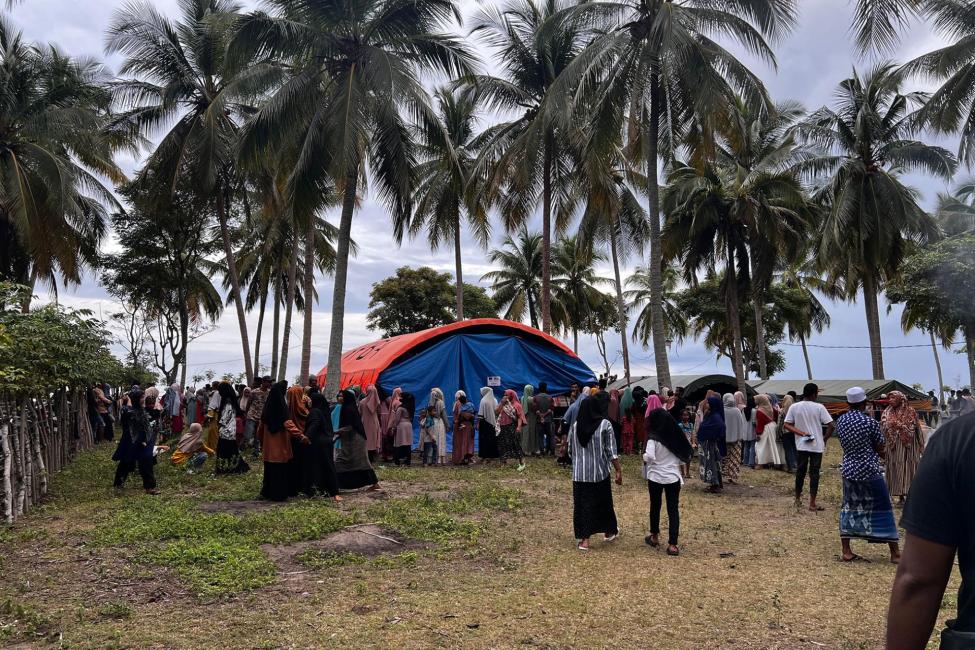-
Who we are
WHO WE AREThe International Organization for Migration (IOM) is part of the United Nations System as the leading inter-governmental organization promoting since 1951 humane and orderly migration for the benefit of all, with 175 member states and a presence in over 100 countries. IOM joined the United Nations system in September 2016.
About
About
IOM Global
IOM Global
-
Our Work
Our WorkAs the leading inter-governmental organization promoting humane and orderly migration, IOM plays a key role to support the achievement of the 2030 Agenda through different areas of intervention that connect both humanitarian assistance and sustainable development.
Cross-cutting (Global)
Cross-cutting (Global)
- Data and Resources
- Take Action
- 2030 Agenda
Internal Displacement in Sudan Nearly Doubles Since Onset of Conflict
Geneva – The number of people internally displaced has nearly doubled since the start of the conflict in Sudan according to the latest figures by the International Organization for Migration’s (IOM) Displacement Tracking Matrix (DTM).
Nearly 7.1 million people are internally displaced within Sudan, of that 3.8 million are newly displaced as a result of the violence that erupted mid-April between the Rapid Support Forces (RSF) and the Sudanese Armed Force (SAF). Most internally displaced persons (IDPs) are in River Nile, East Darfur, Northern, South Darfur, Sennar, and White Nile states.
The conflict has caused a severe humanitarian crisis as shortages of food, water, medicines, and fuel have become extremely acute. Prices of essential goods have dramatically increased due to disrupted trade routes and limited access, making them unaffordable for those remaining in besieged towns and cities across Sudan. Widespread human rights violations have been reported, including gender-based violence, forced displacement, and killings of civilians.
Since the onset of violence, more than one million people have fled to neighbouring countries, with Chad receiving the most arrivals followed by Egypt, South Sudan, Ethiopia, Central African Republic, and Libya. Of these, 67 per cent are Sudanese nationals.
Needs in Sudan are at an all-time high, with 24.7 million people – or half of the country's population – in need of humanitarian aid and protection.
“The people of Sudan deserve peace. Any further escalation of violence would further devastate the country and the region,” said Federico Soda, IOM Director of the Department of Operations and Emergencies.
Following the alarming increase in the number of people affected and displaced by the crisis, IOM's Response Overview for the Sudan Crisis and Neighbouring Countries has been revised to double the funding requirement to USD 418 million for double the number of people – 1.9 million. To date, only 21 per cent has been funded.
IOM is committed to stay and deliver in Sudan, with operations in all 18 states. However, intensified hostilities, fighting, and other obstacles faced by aid organizations continue to make access to people in need extremely challenging in many areas of the country.
In Sudan, IOM has been providing migrants, IDPs, and host community members in vulnerable situations with essential items such as blankets and kitchen sets, health care, including mental health and psychosocial support (MHPSS), and hygiene, protection and cash assistance.
Through the Rapid Response Mechanism as well as the Common Humanitarian pipeline, 76 containers with critical and life-saving humanitarian aid have been received. IOM and its partners work diligently to reach as many people in need as possible. IOM has two operational Migrant Resource and Response Centres in Kassala and Gedaref states and is helping stranded migrants in Sudan with voluntary humanitarian return to their country of origin.
In decentralizing its approach and to increase IOM’s agility and flexibility to respond in hard-to-reach areas, IOM has now successfully piloted a cross-border convoy from Egypt to Sudan with 3,300 hygiene kits offloaded in Wadi Halfa, Northern state, which will soon be distributed to IDPs. Similarly, as part of the interagency cross-border missions, IOM is preparing for a first cross-border movement of humanitarian aid from Chad to West Darfur.
“As needs continue to rise, we reiterate our appeal to the international community to urgently support relief efforts and help ensure life-saving aid is delivered before it’s too late,” added Soda.
IOM’s Global Crisis Response Platform provides an overview of IOM’s plans and funding requirements to respond to the evolving needs and aspirations of those impacted by, or at risk of, crisis and displacement in 2023 and beyond. The Platform is regularly updated as crises evolve, and new situations emerge.
***
For more information, please contact:
In Geneva: Safa Msehli, smsehli@iom.int, +41 794035526

